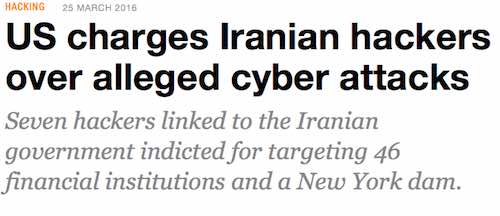By Megan Barth ——Bio and Archives--May 7, 2016
American Politics, News | CFP Comments | Reader Friendly | Subscribe | Email Us
 We have to do everything we can to encourage the entrepreneurial spirit, wherever we find it. We should be helping American companies compete and sell their products all over the world. We should be making it easier and faster to turn new ideas into new jobs and new businesses. And we should knock down any barriers that stand in the way. Because if we're going to create jobs now and in the future, we're going to have to out-build and out-educate and out-innovate every other country on Earth. -- President Barack Obama, September 16, 2011
Fantastic sound bite, but....
Despite the ever increasing digitalization of our society, computer science remains an afterthought in our K-12 educational system. 75% of schools in America offer no CS learning opportunity. Only 40% of those that do offer it, accept it as credit towards graduation. As a result, America is not producing enough computer scientists to keep up with our current or future demands.
We have to do everything we can to encourage the entrepreneurial spirit, wherever we find it. We should be helping American companies compete and sell their products all over the world. We should be making it easier and faster to turn new ideas into new jobs and new businesses. And we should knock down any barriers that stand in the way. Because if we're going to create jobs now and in the future, we're going to have to out-build and out-educate and out-innovate every other country on Earth. -- President Barack Obama, September 16, 2011
Fantastic sound bite, but....
Despite the ever increasing digitalization of our society, computer science remains an afterthought in our K-12 educational system. 75% of schools in America offer no CS learning opportunity. Only 40% of those that do offer it, accept it as credit towards graduation. As a result, America is not producing enough computer scientists to keep up with our current or future demands."When a course is an elective, it's often marginalized in a couple different ways," says Cameron Wilson of Computing in the Core, a non-partisan advocacy group that aims to get computer science listed as a core academic subject in more states. "First is that students often don't have a lot of room in their schedules to take electives because they're busy taking four years of math, English, science and social studies courses. Second, when a subject is an elective, it often doesn't receive the same attention and resources at the state and district level that core courses do."In order to rise to the challenge to "do everything we can to encourage the entrepreneurial spirt, wherever we find it," maybe we could knock down the obvious barriers that stand in the way of our K-12 students. Maybe we should start looking for these entrepreneurs in halls of our classrooms and providing them with the classes and credits to pursue their technological dreams? If 75% of K-12 schools in America do not offer computer science classes, how are we going to out-build, out-educate and out-innovate every country on Earth?

Support Canada Free Press

"These ubiquitous hidden computers have gradually and quietly been put in charge of all manner of critical infrastructure--including nuclear power plants, the grid, water and gas pipelines, refineries, air traffic control, trains, factories, you name it. Unlike the computers we use in our daily lives, these computers are largely invisible. They don't have screens or keyboards. Most people aren't aware that they exist. And yet they are embedded in low-level processes. They are everywhere because they create tremendous efficiencies and cost savings, and because they exist almost as an afterthought, they are often completely insecure. They often don't run anti-virus software and by and large no one bothers to scan them to see if they might be infected with malicious software. And guess what? They often are connected to the Internet where a clever hacker half a world away can get access to them!"Hackers like China, Russia, or Iran? As these cyber attacks from our enemies continue to make headlines, investing in computer science does not only feed the entrepreneurial spirit or complete a collegiate credit, this investment will create the intellectual manpower needed to protect us against all enemies foreign and domestic. With all of the smart technology in this technological age, maybe we should look at instituting smarter curriculum for our future leaders. That isn't rocket science. It's computer science.
View Comments
Megan Barth, is co-chair of RedWave America PAC and The Media Equality Project. She serves as national spokeswoman for MediaEqualizer.com, the leading online watchdog for the intersection of Media, Technology and Government. .